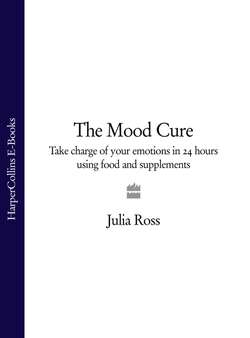Читать книгу The Mood Cure: Take Charge of Your Emotions in 24 Hours Using Food and Supplements - Julia Ross - Страница 94
How Many External Stressors Do You Currently Face, and How Do You Cope with Them?
ОглавлениеAmong all the various factors contributing to adrenal burnout, the most obvious ones are the external stressors: the overwork, illness, injury, pain, cruelty, privation, fear, and loss that life so often presents us with. Relationships at home and at work are our primary sources of this kind of stress, and this has probably always been the case, but some new factors, unique to the twenty-first century, explain why up to 90 percent of all visits to primary care physicians are now prompted by stress-related problems:7
We are eating the most stressful diet ever known. Ironically over 70 percent of us eat the very worst junk foods in order to relieve our emotional stress!8
Today, over 75 percent of our households are single-parent families, many living far from extended family members.9 This means that both adults and children are now impacted as never before by too little time and too little support.
Pressures in the workplace have skyrocketed. There’s been a 700 percent increase in workmen’s comp claims for mental stress since the 1980s in California alone, and 25–40 percent of American workers now report stress burnout, particularly women with children. Stress ranks second only to family crisis among problems in the workplace.10
The chemical pollution that is overwhelming our food, soil, air, water, and even our buildings adds a whole new dimension to the stresses we face.
Rising rates of adolescent suicide, the third leading cause of death among teens, are closely tied to stress, and even children complain of stress now, with up to one in ten suffering from a serious anxiety or panic disorder.11
It all adds up to an extraordinary new, specifically Western, style of stress.
The nutritional suggestions I’ll make in this chapter can help you cope with these external stressors. However, they cannot take the place of an honest assessment of your life, of the draining realities that you may need to eliminate or learn how to handle more constructively, or of the counsel and prayer that you may require in the process. Sometimes changing your job or getting counseling with your spouse can miraculously return you to your old self. Other times something as simple as learning to cry can help tremendously. In an early study on stress, the parents of children dying of leukemia had their stress levels tested. The parents who did not cry had much higher levels than those who were able to cry. We now know that crying serves a very specific biological purpose. Human tears, unlike the tears of any other animal, contain a substance called ACTH, the hormone that actually sets off the stress response and is literally washed away by a good cry.12
In counseling you can learn to cry and to breathe deeply, to assert yourself, to express anger appropriately, and to simplify your life. But if your stress has gone on for too long, you may recover only part of your natural vitality by changing your circumstances. If that’s the case, you can find the rest of it by following the suggestions in this chapter. And if you haven’t yet been able to make those stress-reducing changes in your life, you may need to get in shape first. Big changes (even good ones) do cause more stress, so you’ll be much more effective if you get into nutritional training now.
Are You Nourishing the A Team? Nutritional catch-up really should be your first priority. Why? Because something else has been increasing, right along with on-the-job pressure, pollution, and our private ordeals. It’s the junk food epidemic. We’re undernourished as never before, burdened with an unprecedented fear of food and calories combined with an inability to limit our consumption of stressful sweets, caffeine, and other fast foods. Too often we have no time to prepare fresh food. Too often we don’t eat at all. It turns out, though, that the more stress we’re under, the better we have to eat, to literally “keep up our strength.” Instead, partly because we’ve run out of time and energy, under stress, we’ve taken to eating more poorly than ever before in history. Most fast food is low in nutrients and high in system-shocking sugar, rancid fats, and chemical additives, so it actually adds to our stress level instead of subtracting from it.
The one thing that may be harder on us than eating stressful foods is not eating anything.
